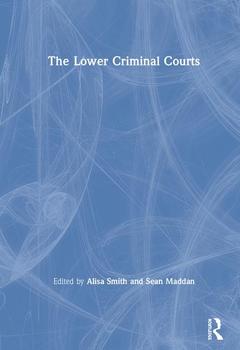The Lower Criminal Courts
Coordonnateurs : Smith Alisa, Maddan Sean

This book explores misdemeanor courts in the United States by focusing on the processing of misdemeanor crimes and the resultant consequences of conviction, such as loss of employment and housing, the imposition of significant fines, and loss of liberty?all amounting to the criminalization of poverty that happens in many U.S. misdemeanor courts. A major concern is the lack of due process employed in lower courts. Although the seminal case of Gideon v. Wainwright required the appointment of counsel to individuals too poor to hire counsel in felony cases, it was not until 1967, when the President?s Commission on Law Enforcement and Administration of Justice found a crisis in the lower courts, that the Supreme Court extended the right to counsel to some (though not all) prosecutions of misdemeanor offenses.
The first step to improving our understanding of the lower courts is a concerted effort by scholars to focus on the processing and outcomes of misdemeanor cases. This collection begins to fill the void by providing a comprehensive review of the scholarly work on the lower courts in the United States. Collecting analysis from key academics engaged in work in this area today, the book reviews the varying specialized lower criminal courts, including specialty courts that have emerged in just the last couple of decades, along with discussions of the history, legal challenges, operation, primary actors (judges, prosecutors, defense counsel, and defendants), and current research on these courts. The book explores the profound consequences misdemeanor processing has for defendants and discusses the future of the lower criminal courts and offers best practices to improve them.
The Lower Criminal Courts is essential for scholars and undergraduate and graduate students in criminology, sociology, justice studies, pre-law/legal studies, political science, and social work, and it is also useful as a resource providing legal practitioners with important information, highlighting the significance of consequences of misdemeanor arrests, detentions, and adjudications.
Section 1. Introduction to the Legal and Empirical History of the Lower Courts; 1. Introduction—Why Misdemeanor Courts Matter; 2. Legal History of Misdemeanor Courts; 3. The Process is the Punishment Revisited: Forty-Year Anniversary Review; Section 2. Research and Scholarly Work on Misdemeanors Today; 4. The Impact of Broken-Windows Policing on Lower Criminal Courts; 5. Providing Counsel for Defendants: Access, Quality, and Impact; 6. Misdemeanor Justice in Rural Courts; 7. The Validity of Misdemeanor Pleas; 8. Minor Crimes, Major Impacts: An Examination of Racially Disparate Outcomes in Misdemeanor Court Processing; 9. The Financial Consequences of Misdemeanors; 10. Specialty Courts as Lower Criminal Courts; Section 3. Recommendations for Reforming the Lower Courts; 11. The Prosecutor in the Misdemeanor Courtroom: Nudging Culture Change in Policy and Practice; 12. Bail and Pretrial Detention Reform in the Lower Courts; 13. Necessary but Not Sufficient: A Reexamination of Procedural Justice in the Lower Courts (and Beyond); 14. The Future of Drug, Homeless, and Veterans Courts; 15. Conclusion
Alisa Smith is an Associate Professor and the Chair of the Department of Legal Studies at University of Central Florida. She holds a PhD in Criminology and Criminal Justice, and a JD from the Florida State University. She practiced law for 29 years, mostly in the area of criminal defense and appeals. She has authored more than 20 peer-reviewed and law journal articles, reports, and book chapters, and she has authored two previous books. Her research has appeared in the Journal of Criminal Justice, Florida Law Review, and American Journal of Criminal Law.
Sean Maddan is Associate Professor and Chair of the Department of Social Sciences at Texas A&M International University. Dr. Maddan has authored over a dozen articles which have appeared in many outlets including Justice Quarterly, Crime and Delinquency, Journal of Criminal Justice, and the American Journal of Criminal Justice. Dr. Maddan has also authored/co-authored several books. His most recent book is the fifth edition of his statistics book.
Date de parution : 06-2019
17.8x25.4 cm
Disponible chez l'éditeur (délai d'approvisionnement : 14 jours).
Prix indicatif 184,47 €
Ajouter au panierDate de parution : 06-2019
17.8x25.4 cm
Disponible chez l'éditeur (délai d'approvisionnement : 14 jours).
Prix indicatif 58,78 €
Ajouter au panierThème de The Lower Criminal Courts :
Mots-clés :
Uncertainty Avoidance; Court outcomes; Problem Solving Courts; Court processes; Drug Court; Criminalization of poverty; Successful Drug Court; Collateral consequences; Circuit Court; Extra-legal factors; Lower Criminal Courts; Sentencing; Specialty Courts; Criminal defendants; Courtroom Workgroup; Lower courts; Misdemeanor Defendants; Midemeanors; VTC; loss of employment; Therapeutic Jurisprudence; Domestic Violence Courts; U.S; misdemeanor courts; Pretrial Detention; misdemeanor crimes; Drug Court Participants; loss of liberty; Drug Court Programs; Limited Jurisdiction Courts; Mental Health Courts; Broken Windows Policing; Guilty Pleas; Misdemeanor Arrests; Veterans Courts; Felony Courts; Misdemeanor Convictions; Plea Offers; Rural Courts
